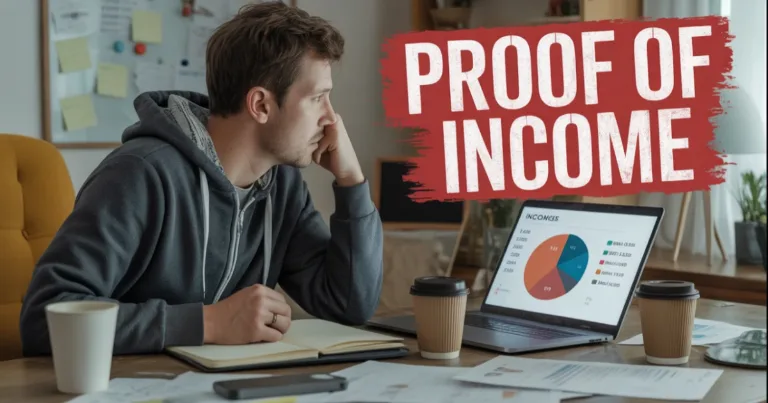Online Income Is Cool Until You Have to Prove It Exists

By Alex David Du · Updated
Alex writes about gaming, tech, and simple online income ideas, and builds projects that bring ideas to life.
Working online sounds like the dream, right? I mean, I get to work in sweatpants, skip traffic, and sometimes even nap in the middle of the day. I can make money while sitting in a café or half-asleep on my couch. Pretty sweet.
But then life hits you with something dumb like, “Hey, we need a salary certificate,” or “Can you prove your income for this rental?” And suddenly, all that cool digital freedom turns into a big ol’ headache.
Why Online Income Sounds Awesome (Until It’s Not)
When people hear I work online, their reactions usually fall into two categories:
“Whoa, that’s so cool! You’re your own boss?”
or... “Wait, but like... how do you actually get paid?”
And honestly? Both reactions are fair. Online income is cool. I can make money from YouTube ads, freelance gigs, affiliate links, blog revenue, or whatever else I decide to hustle that month. It’s flexible. It’s fun. And it doesn’t feel like a normal job.
But here’s the part no one talks about. When you actually need to show proof that your money is real, like for a visa, an apartment lease, a loan, or anything semi-adult, it gets weird fast. No paystubs. No HR department. Just me, my laptop, and a confusing email thread from some random client who paid me via PayPal three weeks ago.
Online income is real... until someone asks for paperwork.
Salary Certificates: What They Are and Why They Matter
If you’ve ever tried renting a place, applying for a visa, or even just opening a bank account, you’ve probably been asked for something called a “salary certificate.”
It’s basically a letter from an employer that says:
Yes, this person works here
Here’s how much they earn
Here’s how often they get paid
And yes, it’s all legit
It’s kind of like the adult version of a school note that says “Please excuse Alex, they were totally doing real work.” But instead of your mom writing it, it’s supposed to come from your boss or HR.
A lot of official stuff requires this certificate. Landlords want it. Banks ask for it. Even signing up for certain services might trigger the “we need income proof” conversation. This guide from Zimyo explains what a salary certificate looks like and why it’s commonly required, in case you’ve never seen one before.
That’s totally doable if you’ve got a regular job. But if you’re like me, and your income comes from a mix of freelance gigs, ad revenue, affiliate links, and maybe the occasional digital product... who’s supposed to write your certificate?
Exactly. That’s when things get awkward.
Where It Gets Tricky for Online Workers
Making money online is fun until you realize the rest of the world still expects you to be “normal.” Like, with a boss, a payslip, and an HR person who can confirm you exist.
But if you work for yourself or take gigs from random places around the internet, none of that exists. There’s no company letterhead. No one to call and say, “Yeah, Alex works here full-time.” It’s just you, some digital invoices, and maybe a PayPal history that looks more like a side hustle than a real income stream.
The weird part? You are working. You’re earning money. But unless you can package it in a way that looks official, some people won’t believe it. Or worse, they’ll say it doesn’t count.
That’s the struggle. You’re doing legit work, but because you don’t fit into the old-school system, you’re constantly trying to prove you’re not faking it.
What I’ve Learned Trying to “Look Official” as a Freelancer
I’ve lost count of how many times I’ve had to “explain” my job. Not just what I do, but that it’s real. And even when people believe me, there’s still the follow-up: “Cool... but can you prove it?”
So yeah, I’ve learned a few things.
Keep clean records
Even if you’re just getting paid through PayPal or bank transfers, keep screenshots. Save invoices. Organize your emails. It’s not fun, but it saves you when someone asks for proof.Make your own documents
I’ve written my own income letters. Sounds sketchy, but hear me out. If there’s no boss to do it, you are the boss. Just make sure it’s honest, clear, and looks professional. I even made myself a simple “freelancer salary certificate” once. Added my logo, signed it, done.Get help from platforms
If you work through freelance sites or affiliate networks, some of them will actually give you downloadable earnings reports. Use those. They look way more “official” than a handwritten note from yourself.Don’t fake stuff
It’s tempting, I get it. But don’t mess with fake documents. Just not worth the risk. There’s always a smarter, honest way to show your income.
At the end of the day, being your own boss means figuring this stuff out yourself. No HR, no templates, just trial, error, and Google Docs.
How to Prep for Proof: Tips for Online Earners
If you’re making money online, someone will eventually ask you to prove it. And the last thing you want is to be scrambling through random folders trying to piece things together. Here’s what I’ve learned about staying ready:
TipWhat to DoMake monthly income summariesTrack your income in a simple doc every month. List where it came from and how much. Keep it updated so you’re not backtracking later.Use consistent payment methodsStick to one or two platforms like PayPal or direct bank transfers. It makes your income trail easier to explain when asked.Save invoices and receiptsEven if it’s a casual job, create and save invoices. Screenshot platform payouts and keep them as PDFs for your records.Have a template readyBuild your own salary certificate template. Add your info, sign it, and use it when someone needs official-looking proof.Get organized earlyStart saving records before anyone asks. Whether it’s for housing, services, or taxes, being prepared saves stress later.
Being your own boss is great, but part of the job is staying organized like a real adult. Even if your office is your bed.
When you need to show proof
Working online is real work, it just needs clean proof. Keep a monthly summary, stick to one or two payment methods, save invoices as PDFs, and store platform reports in one folder. Have a simple income letter template ready with your name, dates, and totals, then attach bank or PayPal statements that match those numbers. No faking, no guessing. When someone asks, you send the packet and move on. Your work is legit. Keep the receipts.

